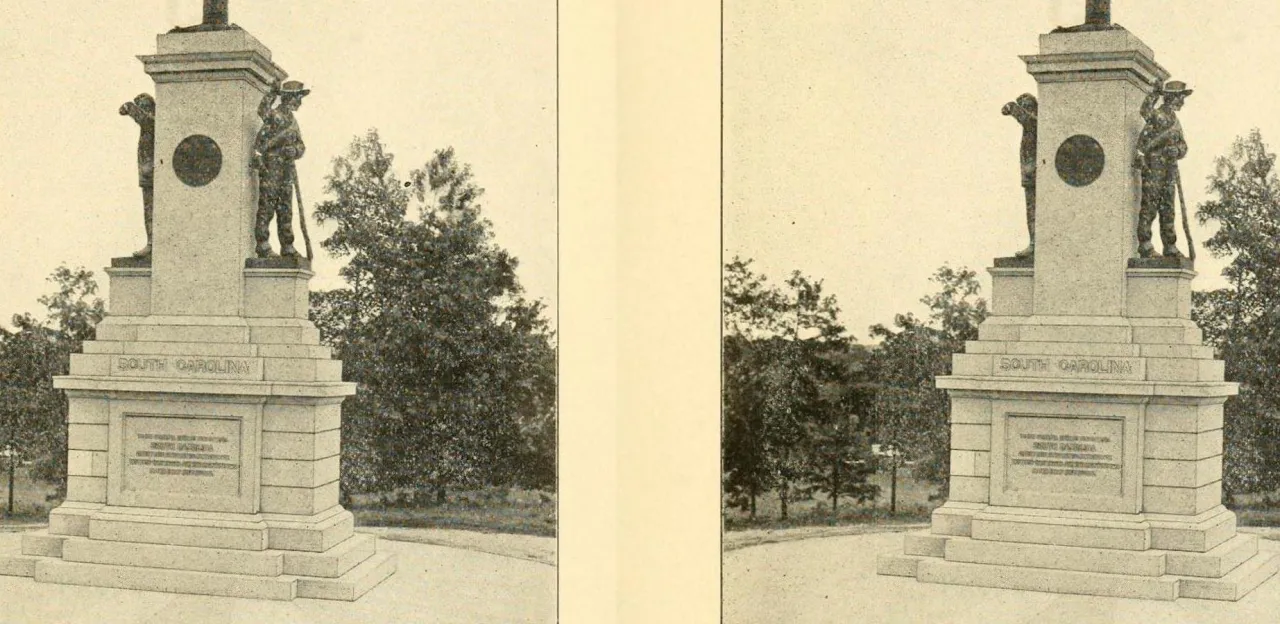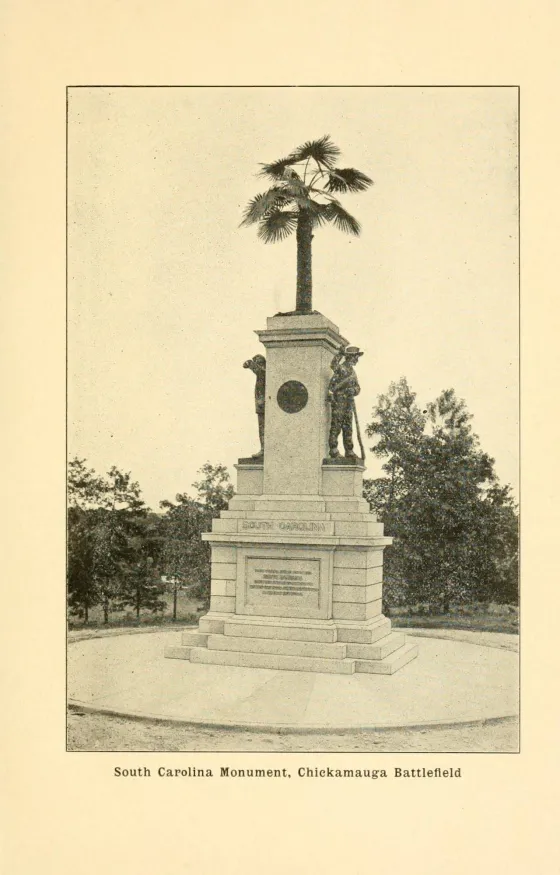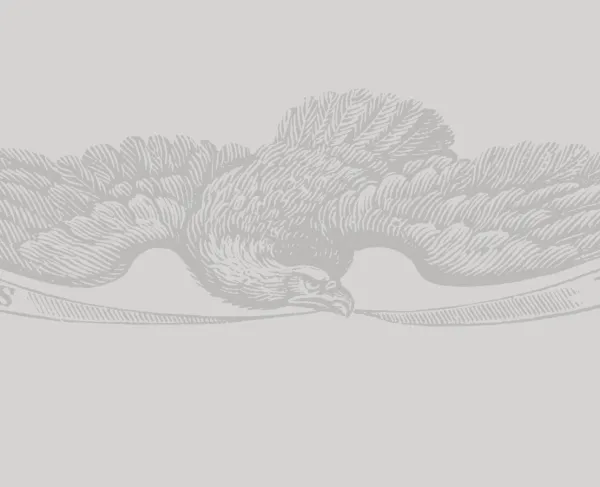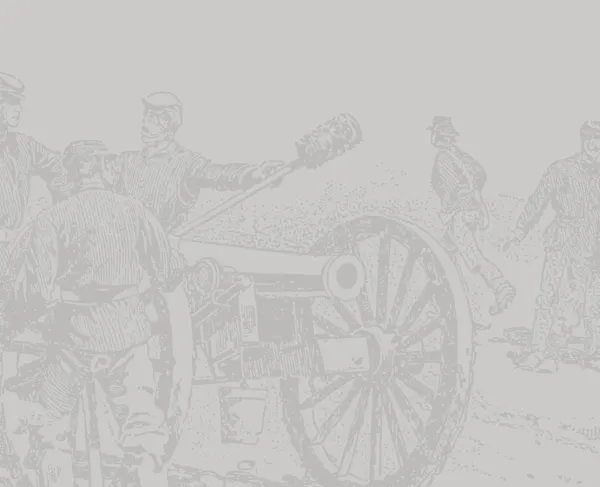Third Dedication Speech for the Unveiling of the South Carolina Monument on the Chickamauga Battlefield

Dedication speech of South Carolina Senator, D. S. Henderson, for the dedication of the South Carolina Monument at Chickamauga:

Ladies and Gentlemen: —
Americans, through all stages and periods of their history, have fought, and ever will fight, for the preservation of what they honestly believe to be founded in principle. From the byways and hedges of Lexington to the marches of Yorktown our forefathers fought to establish the equal rights of men against the exactions and encroachments of tyrants. The blood of Warren sprinkled on the green sward of Bunker Hill, and the blood of Jasper, bespattering the ramparts of Savannah, were alike sacrifices upon the altar of patriotism for love of liberty.
The blood of the brave McPherson freely shed on the plains (26) of Atlanta; and the blood of the immortal Stonewall Jackson, running freely amid the fastnesses of the Wilderness on that fatal night, were alike unstinted offerings of devotion to duty, and conscientious conviction of right.
Neither were rebels. Both were patriots. As much so as the heroic Warren or the brave Jasper.
When the din and turmoil of the Revolutionary struggle had comparatively subsided, the separate and independent colonies entered into "Articles of Confederation" and a "Federal Constitution," in every line and sentence of which, and in every utterance of debate from which they emanated, is written the understanding, that the union was voluntary, with each State remaining a separate entity; and such powers alone were given the Union as were expressed and set forth. All others were reserved to the States and their citizens.
Time rolled on. Prosperity followed adversity. The impetus of Freedom gave momentum and push to the engines of development and enterprise. Individual aggrandizement and sectional interest brought on political turmoil and unrest. Right or wrong the whole country was in a fermentation. The one side asserting the "'indissoluble Union," the other asserting the "Indestructiable [sic] States."
South Carolina, whom in part I represent on this auspicious occasion, (the home of John Rutledge, one of the first Chief Justices of the Supreme Court of the United States; the home of that eminent Pinckney whose enunciation, "Millions for defense, not a cent for tribute," will ever be a paean in the cause of freedom); South Carolina on the 20th of December, 1860, by solemn conventional action, retired from that confederacy, which she had voluntarily joined and to which she had freely contributed of blood and treasure.
In the ides of the following April the first gun* "of the war between the States," reverberated in the harbor of old Charleston.
The North armed to sustain its views of the union. The South armed to sustain its ideas of the sovereignty of the States and freedom of action
As that great Englishman, an impartial witness, Lord Wolseley, has truly expressed it. "The true cause of the conflict was antagonism between the spirit of Federalism and the principles of State's Rights '
Bull Run ran red with the gore of brothers. "On to Richmond" was the cry in the East. ' On to Atlanta"' the cry in the West.
The sanctity of our homes and our hearthstones; the exercise (27) of home rule and home government aroused every energy of the South; and from "the cradle to the grave" the call to arms was heartily obeyed.
"They left the ploughshare in the mould,
The flocks and herds without a fold "
Through the clover fields of that grand green valley of old Virginia the tocsin of the dread struggle sounded and surged. Marathon and Thermopylae, Pharsalia and Cannae, were sur- passed in glory and heroism.
The scene shifts beyond the beautiful blue mountains. Gaines' Mill and Frazier's Farm and Malvern Hill, are enveloped with the smoke and turmoil of the fray. Never did ancient warriors, whether Grecian, Roman, or Macedonian, show greater courage and fortitude than that which the American soldier on both sides exhibited on these ensanguined fields.
No mediaeval Cavalier with burnished armor and drawn scimeter [sic] ever felt the patriotism that animated the bonnie boys of the Southland who tramped victorious over the Seven Days battlefields around Richmond.
Again Manassas shouts forth the horrible sounds of perilous battle, and goes down into history as a victory for the immortal Lee, more illustrious than Montibello or Solferino were to the great Bonaparte.
McClellan. with his almost countless thousands, again grapples with the hardy veterans along the waters of the Antietam; and sharp and fearful is the carnage.
The God of Battles himself must have wept over the fearful destruction of American manhood.
At Fredericksburg the heroic life of Maxcy Gregg, Carolina's great soldier, and that of Tom Cobb, Georgia's valiant son, flowed out; and the myriads of Burnside were as easily driven back as those of Xerxes in the olden times.
Chancellorsville, with its great victory but its sad loss, looms up. Jackson passed over the river and rested under the shade of the trees; and Jeb Stuart with his flowing plume and keen Damascan blade led the Stonewall brigade and their associates to victory with as much dash as ever did Henry of Navarre, the lion-hearted Richard or the impetuous Murat.
We crossed the river once more!
Around the Cemetery heights and Seminary Ridge the alarm of war broke loose with its most terrible vigor. The defensive had been transferred to the North; and when Pickett and his veterans were decimated, and the tide of fate bore back his bleeding columns, Robert E. Lee met them amid the (28) crashing shells and crushing shot, and told them in that manly moral, heroic manner, "It is not your fault boys, it is all mine."
"Nor purer sword led braver band,
Nor braver bled for a brighter land,
Nor brighter land had a cause so grand,
Nor cause a chief like Lee."
From the beginning of the struggle, in the Great West, where the hardy frontiersmen of the North met the sturdy huntsmen of the South, the combat was more equal, exacting, and uncertain.
Donelson, Henry, and Vicksburg with their misfortunes and mistakes passed into history.
Shiloh, with its two days of burning achievement electrified the world as an exhibition of the battle power of American manhood. Its first day of glorious victory to the South, dimmed only when "freedom shrieked" as Sidney Johnston fell, was scarcely overbalanced by the success of the second day to the North, brought about chiefly by that pertinancity [sic], stern determination, and confidence which characterized U. S. Grant as a born leader of men.
The Gray and the Blue grappled together on many a gory field from the Mississippi to the Tennessee. The Stars and Bars and Stars and Stripes waved defiance at each other across many a ravine of that grand region. Bedford Forrest, "the noblest Roman of them all," led his troopers triumphant from one end to the other.
In the crucial year of 1863 when the shortening days of September came, and the halo of the Indian summer was creeping over this favored region of Georgia and Tennessee, the electric batteries of horrid war stirred the lethean waters of this "River of Death," and its searchlights illuminated these grand overhanging mountain peaks with a luridness never to be forgotten. Once again as in its legendary historic past, old Chickamauga became the tramping ground of hosts of men embraced in an ensanguined struggle for annihilation and destruction Both sides were ably led. Both sides fought nobly. Both sides conscientiously acted. All of them patriots; none of them rebels.
Lee had detached, from Virginia, and sent his great Corp Commander, Longstreet, with his hardened veterans to aid the Confederate Chieftain, Braxton Bragg, (he the same Captain Bragg who under the Stars and Stripes at the bloody Mexican battle of Buena Vista, had received and valiantly carried out the memorable order of Gen. Taylor, "Give them a little more grape, Capt. Bragg.") (29)
Grant had hurried forward the flower of the Western Army to the aid of the Federal Commander, Rosecrans, "And when the mists had rolled away" on that autumnal Sabbath morn of the second day and revealed the serried ranks of the opposing hosts to each, other, it was a sight before which the Sun of Austerilitz would have dimmed, and a sight to which the old Guard of Napoleon and the English Squares of the Iron Duke at Waterloo, opposing each other, was but a circumstance.
What was done — what deeds of daring were achieved — what charges and counter-charges were developed — how batteries were handled with wonderful scientific skill — how battalions of infantry and squadrons of cavalry covered themselves with glory — how particular commands and individual commanders especially distinguished themselves, those who were here and mingled in the fray can better tell than I.
The carnage of the contest best tells the tale of the fighting 16,179 on the side of the Federals; 17,804 on the side of the Confederates.
When nightfall came the complete discomfiture of the Federal Army was arrested only by the intrepid stand of George H. Thomas, himself a Virginian, who has gone down into history as the "Rock of Chickamauga," and whose name as an imperturbable leader of fighting men should be written high in the gallery of fame.
How those who perished here, whose blood darkened these slopes, ravines, and hillsides, are revered by their people at home, is told in mute and silent language by the monumental spires that have been erected in this National Park by sixteen of the States of this reunited Union at the aggregate cost of $506,000
It was certainly a befitting and magnanimous act on the part of the Government of the United States to permit the establishment of a National Park on this battlefield where the Confederates obtained the advantage, and especially when the Act of Congress permits both sides to mark their lines of battle and to erect monuments over their gallant dead The South has accepted the opportunity and joins in the spirit of reconciliation.
She did her best. Whatever she had of blood, of treasure, of spirit and love, she unstintedly [sic] laid upon the altar as a sacrifice for love of freedom and liberty of conscience.
What Courts and Constitutions and Conventions and Congresses and Presidents could not do, it took the arbitrament of stern war to do. The "Indissoluble Union" on the one side, and "indestructible States" on the other side, have become the "indissoluble Union" of "indestructible States." (30)
Whoever else we may fight, as an American people we will never again fight ourselves. Dissensions and strifes [sic] and turmoils [sic], begotten of political fermentations and upheavals, will come; but the question of the separate action of the States (whilst they had their rights, which exist and are respected every day by the Courts and the Government) is settled for all time.
Today the Palmetto State, the grand old Commonwealth of South Carolina, as a member of the American Union, comes to this shrine of sacrifice, this altar of freedom, where the pride and glory of her yeomanry shed their blood, to show her appreciation of their patriotic endeavors.
True, she was the "cradle of secession," but she always was, and always will be, a leader in conscientious action; and her history of patriotic devotion to duty has been open to the world from the time she joined with Massachusetts in defying the tyranny of "taxation without representation" to the present time.
For her devotion to republican principles as fairly understood by our forefathers, let the bones of her sons who 'perished at Kings Mountain, at Cowpens, at Eutaw, and at the Palmetto Fort, speak! For her determination to perpetuate those principles let the blood of Bonham who perished at the Alamo, and the Palmetto boys who fell with Butler amid the halls of the Montezumas speak!
For her firm determination to stand, and to die for what she conscientiously believed to be right, let the trail of her dead and wounded in the war between the States from the Potomac to the Rio Grande speak!
"Carolina's dead, Carolina's dead
On every hill they lie"
In Virginia her spirit was evinced by the brave boys led by such men as Hampton and Butler and Gary and McGowan and Hagood.
Ripley and Elliott, Rhett and Mitchell, Gilliard and Huegenin, and their noble boys stood amid the crumbling walls of Sumter for four years and never surrendered.
And here, right here, amid the crashing of arms, the martial muster of battle and the terrifying trials of the fray, Joseph B. Kershaw, States Gist, Ellison Capers, Irvine Walker, Arthur M. Manigault, John D. Kennedy, and those chivalric warriors, Elbert Bland and John S. Hard, who fell with their faces to the foe within a few feet of the place where we now stand; and those other brave gentlemen who led her boys to (31) victory on this spot, illustrated the spirit of Carolina, always prepared to do her duty.
The granite shaft has not yet been cut that would be tall enough to commemorate the deeds of her private soldiery.
Her white voting population in 1860 was 58,000, yet she sent to the war 65,000 soldiers, rank and file. There is no parallel in history to such a record.
From the first bud of youthful manhood to the gray haired fathers, they went without a murmur, and fifty per cent, were killed and wounded.
Let the Palmetto tree which stands as the cap piece to yonde [sic] monument, remain there forever as the memorial of her veneration for the deeds of her brave boys; and when in after years Carolinians of another age stop here to view it, let them in memory recall the fact that on the monument erected at her capitol city, Columbia, by the women of her State to the Confederate dead, is graven that wonderful sentence so powerfully put by the polished John S. Preston, which applies to all alike, there and here: ''Let the stranger who may in after times read this inscription recognize that these were men whom power could not corrupt, whom death could not terrify, whom defeat could not dishonor, and let their virtues plead for just judgment of the cause in which they perished Let the South Carolinian of another generation remember that the State taught them how to live and how to die, and from her broken fortunes she has preserved for her children the priceless treasure of her memory, teaching all who may claim the same birthright, that truth, courage, and patriotism endure forever."
One more word and I have finished. In this bivouac of the dead, where these silent sentinels, commemorating the love of the living for the departed heroes, lift their heads to high heaven in testimony thereof, we have assembled on this auspicious occasion not as Confederates or Federals, but as Americans, and the survivors of the heroes of both sides, who thirty- six years ago laid aside their arms and returned to the peaceful vocations of life, realizing the fact with satisfaction and pride that they are component parts of the greatest Union of the world.
The South in that period, by earnest endeavor and a candid realization of her situation, without surrender of her opinions, but in the true manly spirit of reconciliation, has resuscitated her waste places and energies much more effectually than France has done from the result of the Franco-German war. We live today in an era of industrial advance without a parallel. We are making history each day, and not simply living on the (32) traditions and ideas of the past. Standing in the dawn of the twentieth century, with its allurements of power; with its impedimenta of growing civilization; with its temptations that beset the new giant — our Republic — among the world powers; and the bewitching enticements which our increased responsibility engenders, it behooves us as a people, as a Republic, (especially when pondering over such memories as are brought to our minds at such places as this where we linger today), to look well to our moorings and aspirations, and to consider our destiny. We are equal to any emergency of advancing civilization, if we as a people only keep our peace with God by our voice and conversation.
We must be equal to the demands that progress creates, without evoluting [sic] in imperialism, else the dream of our forefathers, that the people should rule and are capable of it, becomes a myth.
We should not be laud grabbers or buccaneers for pelf or plunder, but among the nations of the world, boldly asserting our rights to the extension of our commerce under proper treaty relations for the enjoyment of our trade, be content to have the beneficent Monroe Doctrine receive its old-time construction, lest if we extend it to allow us to establish dependencies and colonies elsewhere, the other powers can claim a reciprocal construction for themselves in seizing territory in the Western World.
I stood a few weeks since on one of its busiest, most exciting days, in Wall Street, New York, where the financial pulse of the country, and in fact of the world, can always be felt, and watched with interest that bronze statue of the great Washington erected at that spot where he took the oath of office as the First President of our young Republic, and with his right hand held forward, and in a speaking attitude, he seemed truly typical of that grand warning he gave us in his Farewell Address, never to enter "into entangling alliances with foreign powers."
The kings and emperors; the princes and potentates of kingdoms and empires, kept together by the powers of grand standing armies and navies, sooner or later will need the aid of this people- governed country, which when united can always meet any issue, to wrest them from the rush of arms against each other; but it is better, far better, for us to stand in no compulsory relation with any of them; and free and independent, to act, shaping our own policies based upon pure Democratic principles, and breathing the pure air of national independence and freedom, as typified by our grand mountains, (33) our rolling rivers, and our marts of development and progress. To that end let our hopes and actions lead us; and in the vast and increasingly vast aggregation of American citizenship, there is no class that will render more devout loyalty to the onward march of American enterprise and American progress as the rightful fruit of the heritage handed down to us by the fathers, than the survivors and the children of the survivors of the great war between the States; a struggle unequalled in history, ancient or modern, and out of which has come a reconciliation which, we pray God, may be as lasting, as that struggle was gigantic.
Click here for the full text of ceremonies.





